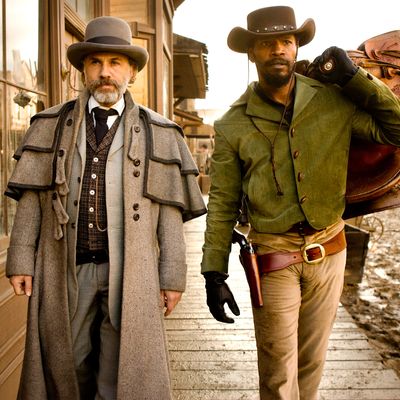
What Nazis were in Quentin Tarantino’s Inglourious Basterds, slaveholders are in his Western Django Unchained: People who are a gas to exterminate. Connoisseurs of “wet” gore will be especially delighted, given that every bullet generates a whoopee-cushion’s worth of red sauce. The only violence that’s not a kick is done unto slaves, who are whipped, torn to pieces by dogs, and, in a particularly ugly moment, driven to slaughter one another for sport. But the helpless rage we feel in those scenes is in the service of Tarantino’s larger goal: to make the vengeance on the film’s racists all the more gleeful. Carnage rarely comes so morally uncomplicated.
Django Unchained doesn’t merely hit its marks; it blows them to bloody chunks. It’s manna for mayhem mavens. The cast is hip, but you knew that already — hipsterism is automatically conferred on actors in QT pictures. And though the plot turns are predictable, every scene is apt to wander off into an alley of irrelevance in which comic surprises await — among them a protracted griping session featuring Klansmen who can’t see out their eyeholes. Parts of the film are maniacally funny. Of course, no matter how hard you laugh at Tarantino’s audacity, you have a feeling he’s laughing louder. For all its pleasures, Django Unchained feels too easy, too dead-center in Tarantino’s comfort zone. He’s not challenging himself in any way that matters. He has become his own Yes Man.
As the title gunslinger, a slave liberated (with a couple of gun blasts) from his vicious masters by the puckishly homicidal German dentist turned bounty hunter Dr. King Schultz (Christoph Waltz), Jamie Foxx grits his teeth and stares daggers, but he’s not exactly the life of the party. Maybe that’s because Django’s mind is on his beautiful wife (Kerry Washington). Schultz’s quarry is a pair of wanted men who happen to be the very same scumsucking dirtbags who tore the loving slave couple asunder, branding them first. The black man and the German, fast friends, wind their way through sundry towns full of wide-eyed racists (nobody’s seen a n—– on a horse before); a plantation overseen by Don Johnson in Colonel Sanders threads, stroking his mustache; and, finally, “Candyland,” an even vaster plantation on which rich-boy aristocrat Calvin Candie (Leonardo DiCaprio) buys, sells, and trains n—–s for grisly, to-the-death “Mandingo fighting.” Candie is also an amateur phrenologist, which means he can hold forth eloquently on the inferior brainpan of the n—– race. And he’s not even the most hateful, most dangerous dude in Candyland. That would be Stephen (Samuel L. Jackson), the self-described “house n—–” who is righteously angered by a n—– like Django who doesn’t know his place alongside all the other n—–s.
You’ll notice in the above a goodly number of ellipses, because I can’t write the word that the white characters (plus Stephen) in Django Unchained throw around most liberally. Tarantino took some flak for its occasional use in Pulp Fiction and Jackie Brown, but here he really opens the sluice gates. It’s a smart move: How else can he shock and infuriate us? The movie pays homage to the spaghetti Westerns of the late sixties and seventies, a degenerate genre (Sergio Leone’s magisterial epics excepted) best savored for its subversiveness — for implicitly mocking mainstream American Westerns with their faith in the judiciousness of the justice system and assurances that the unholy excesses of capitalism (in the form of greedy land barons, etc.) were never systemwide. But most of us are well beyond buying into that brand of flimflam. We live in a cynical, plug-ugly grindhouse world that is, at least onscreen, of QT’s making. Absent anything much to subvert, the movie is all potshots and N-words.
Well, there is one novel touch: Jackson’s Stephen. Has there ever been an African-American character so mindfully destructive of his own people? The tone he takes with DiCaprio’s Candie — a mixture of fatherly sternness and obsequiousness — is creepy enough. But it’s how he conspires with his master, pushing him to be even less merciful with Stephen’s fellow slaves, that’s demonic. Since Tarantino is loath to psychologize (and since Jackson’s acting is, as usual, monotonic), we don’t know the whys of Stephen’s identification with his oppressor. We only know he’s lethal — and that he needs a lot of killing.
DiCaprio is very amusing as the petit-king Candie, to the palace born, majestically self-centered but sufficiently steeped in Southern codes of hospitality to preside over a long, formal dinner for guests (Django and Schultz) who are purportedly there to buy a battered Mandingo fighter. (They’ve actually come for Django’s wife.) Laura Cayouette had me laughing out loud as Candie’s sister, who says almost nothing but is graciousness incarnate, offering animated antebellum smiles to nearly every male utterance. Plenty of well-known character actors make villainous noises and die colorfully. But it’s Christoph who waltzes away with the movie. He has elegance, class. He’s ebullient as he blows his foes to kingdom come — his eyes sparkle.
In the grandest action set piece, the joke is that there’s no end of blood you can squeeze from a stone-dead body. Django Unchained should end there but lurches on for nearly half an hour. Tarantino likes his action movies multi-orgasmic. If only he had more visual resources. There are a few seventies-style zooms and whooshes and some tacky slo-mo, but we’ve come to expect the landscape in Westerns (particularly Italian-style) to be a character, sublime or sinister, and here the look is TV-flat, the rhythms flabby. Perhaps that shouldn’t be surprising. In Tarantino’s last few movies, the settings are largely functional, stages on which he can enact his rituals of injury and retribution. If he stays on this track, he’s going to bore all but the gorehounds to pieces —it’s going to be Bland Guignol.


